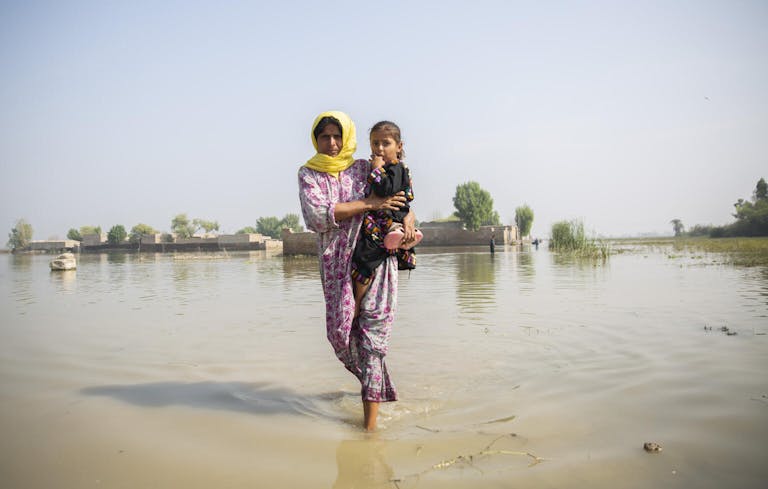Last updated August 16, 2023
Written by: Patty Sanchez Bao, Senior Officer, Global Health, United Nations Foundation
Vector-borne diseases have been considered a problem only in tropical areas for many years. Nevertheless, during the past two decades, they have emerged and re-emerged, spreading to new parts of the world. According to the World Health Organization (WHO), vector-borne diseases affect more than 1 billion people and cause the death of an estimated 1 million people globally per year. Today, more than half of the world’s population is at risk of infection from vector-borne diseases.

The latest Intergovernmental Panel on Climate Change report estimates that climate change will expand the geographic range and, in some cases, the frequency of vector-borne disease outbreaks, including dengue, chikungunya, malaria, Yellow fever, and Zika. Climate change is increasing the frequency of extreme weather events, significantly influencing vector density, abundance, and distribution. During the next 20 years, the challenges and impact of climate change on longstanding, emerging, and reemerging infectious diseases will disproportionately fall on low- and middle-income countries, intensifying risks to the health and well-being of individuals and communities.
In 2022, dengue was reported for the first time in Afghanistan and it also spread to Europe. By 2023, WHO concluded that the incidence of dengue had grown dramatically worldwide, with studies estimating that 3.9 billion people are at risk of dengue infection. The introduction of dengue cases in new areas in the Americas, South-East Asia, and Western Pacific regions is particularly worrisome because in non-endemic areas, the population, including healthcare workers, are immunologically naive and are not familiar with the clinical manifestations of the disease, thus delaying diagnosis and putting patients at severe risk of disease and death.

Likewise, the invasion of the Anopheles stephensi mosquito in sub-Saharan Africa is deeply concerning. According to WHO’s World Malaria Report 2022, An. stephensi, a mosquito native to south Asia and parts of the Arabian Peninsula that can transmit both Plasmodium falciparum and P. vivax malaria parasites, has expanded its geographic range over the past decade. An. stephensi can thrive in urban environments, threatening malaria control and elimination efforts given the high burden of malaria and urban density in sub-Saharan Africa. The mosquito is resistant to many of the insecticides used in public health, thus making interventions, such as the distribution of insecticide-treated nets (ITNs) and indoor residual spraying (IRS), insufficient to counter its advances.

In this context, addressing the growing threat of vector-borne diseases should be paramount in addressing climate change’s effects on health. In the recently published case study Pakistan’s Lessons Learned on Climate Change, Malaria, and Vector-Borne Disease Transmission, Dr. Muhammad Mukthar from Pakistan’s Directorate of Malaria Control reflects on the negative impacts and significant risks climate change poses to public health. In the last couple of years, Pakistan, a moderate malaria-endemic country, has experienced several climate change-induced humanitarian emergencies that resulted in mass population displacement and the heaviest outbreak of malaria (from 376,203 cases in 2021 to 1.7 million cases in 2022) in the last five decades, setting back the progress achieved by the National Malaria Control Program. Pakistan’s experience has generated essential lessons learned on addressing vector-borne diseases amidst climate change-induced humanitarian emergencies that put local authorities and communities at the center of the response efforts. If applied, these lessons could enable more effective and timelier responses to future disasters:
This case study was supported by Asian Pacific Leaders Malaria Alliance (APLMA), the Directorate of Malaria Control of Pakistan, and the United Nations Foundation.
Patty Sanchez Bao is a Senior Global Health Officer at the United Nations Foundation. Patty leads the implementation of the Foundation’s advocacy, communications, and resource mobilization strategy to advance global support for malaria elimination in Latin America and the Caribbean. Patty has many years of experience working on advancing human development for indigenous, women, and other vulnerable populations. She also earned a Master’s degree in Cultural Anthropology from the University of Virginia, a Licenciatura in Social Anthropology, and a Bachelor’s in Social Sciences from the Pontificia Universidad Catolica del Peru.
To get the latest Global Health news from experts like Patty, subscribe to our monthly newsletter.